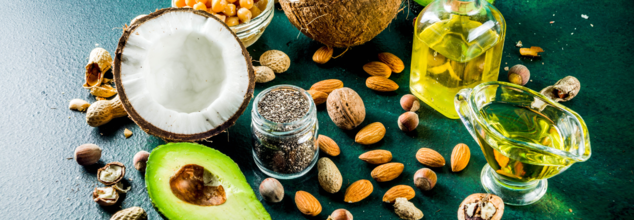
Credit: Canva
15 Staple Foods To Make Healthy Eating Easy All Week Long
Many people love to beat the meal-planning drum. I would know; I am one of them! And while it is true that making your diet chart in advance can help you eat healthier in the real world, pre-planning your family's food is not always realistic. So how to do it? The answer is simple—fill your pantry and fridge with the right and essential food items. This way, creating wholesome meals becomes much easier.
Here Is What You Should Store In Your Fridge To Make Nutritious Dishes At Your Comfort
Canned Chickpeas
A can of chickpeas opens the door to countless dishes. Add them to soups or stews for an easy boost of protein and fiber, or mash them with lemon, dill, and celery to fill wraps. Think chickpea cakes, tacos, and hearty salads. Store leftovers in a sealed container in the fridge for up to a week, or freeze them after drying for longer storage. One cup offers 12.5g fiber, 14.5g protein, and important nutrients like manganese and folate.
Chicken Breast
As one of the most widely available meats, chicken breast is a go-to for stir-fries, sandwiches, pastas, and more. Pair it with a whole grain and a veggie for an easy dinner. Enhance the flavor with pantry herbs like rosemary or garlic powder. Raw chicken freezes well in individual foil packets, while cooked chicken lasts up to 9 months in the freezer. Its high-quality protein supports muscle growth, immunity, and healing.
Smoked Salmon
Already cooked and packed with omega-3s, smoked salmon is perfect for wraps, pastas, or salads. It pairs well with lemon, dill, and even cream cheese. Leftovers can be refrigerated for a week or frozen for a month. Just watch out for its high sodium content — around 600-1,200 mg per 100g.
Extra-Firm Tofu
Pressing tofu helps it crisp up nicely in stir-fries and noodle dishes. Its mild flavor makes it a great canvas for sauces and spices. Keep it in the fridge for 5–7 days or freeze for 4–6 months. With 17g of protein per 3.5 ounces and over 50% of the DV for calcium, tofu is also linked to a lower risk of hormone-related cancers.
Red Lentils
With a cooking time of 20–25 minutes, red lentils shine in dishes like daal. Their earthy flavor is mild and slightly sweet. Once cooked, they can be stored for up to 7 days and used in salads or with sautéed greens. Dried lentils pack an impressive 46g of protein per cup and are great for heart health.
Whole Wheat Spaghetti & Quinoa
Whole wheat spaghetti and quinoa serve as solid meal bases. Spaghetti is fiber-rich, aids digestion, and pairs well with Mediterranean ingredients. Quinoa, a protein-rich grain, is easy to prepare and contains anti-inflammatory flavonoids and key minerals.
Quick Oats & Bone Broth
Quick-cooking oats make for customizable, heart-friendly breakfasts, while bone broth adds collagen, glucosamine, and chondroitin to soups and sauces. Store bone broth in ice cube trays for easy use.
Sweet Potatoes & Frozen Spinach
Sweet potatoes are versatile and potassium-rich, while frozen spinach is great in quiches, smoothies, and pastas, offering iron and antioxidants for eye health.
Grape Tomatoes, EVOO, Onions & Apples
Roast grape tomatoes for deeper flavor, sauté onions for savory bases, and use extra-virgin olive oil for its heart-healthy MUFAs. Apples offer fiber, antioxidants, and a long shelf life.

Credit: Canva
Can Salmon Make You Sleep Faster?
If you struggle to get a good night's sleep, you are not alone. Millions of people toss and turn each night, turning to supplements, meditation, or a hot bath to help them fall asleep faster and stay asleep. While proper sleep hygiene and relaxation techniques work, your diet may play a more important role than you think.
Can Salmon Make You Sleep Faster?
Although fatty fish like salmon is known for its heart-healthy omega-3 fatty acids, it may also help the quality of your sleep. A study published in 2014 in Journal of Clinical Sleep Medicine concluded that men who ate Atlantic salmon three times a week fell asleep more quickly and reported being able to function better the next day compared to a control group. The salmon-eating group also improved their heart rate variability (HRV), which is the variation between heartbeats that indicates how well the body adapts to stress. A higher HRV was linked to falling asleep faster and improved daily functioning. As per dieticians, Vitamin D, Omega-3, or other nutrient content, can help in accelerating this.
How Nutritious Is Salmon?
A 6-ounce filet of cooked Atlantic salmon has 43 grams of protein and almost 14 grams of fat (just 2 saturated grams). You'll find almost 4 grams of omega-3s, which is more than twice the daily recommendation. Looking a little more closely among those omega-3s, there are 2.4 grams of docosahexaenoic acid (DHA) and 699 milligrams of eicosapentaenoic acid (EPA). A 2021 study published in the journal Nutrients had people take DHA-rich oil, EPA-rich oil, or a placebo to see the effect on sleep.
Although the people taking the DHA-rich oil had better sleep efficiency and took less time to fall asleep, they said they felt more sluggish the next day compared to the EPA group. A 2024 review in the Journal of Clinical Biochemistry and Nutrition analyzed the results of eight studies and found that omega-3s may improve sleep quality.

(Credit-Canva)
The Oils You Use In Your Foods Make A Lot Of Difference – Oils You Should Use For Cooking
When it comes to healthy eating, many people discourage using oils in foods. They believe oils of any kind can cause health issues and prefer using cooking techniques like air frying or baking to ensure they are healthy. However not all kinds of oils are unhealthy, many of them are made with good ingredients and are rich with nutrients and healthy fats.
Why Do We Need Oils In Our Diet?
If you are worried about increasing your body’s fat deposits and unhealthy weight gain, then switching to a healthier oil is a good option. Many oils have good fats, these are usually derived from vegetables, nuts, seeds and fish. Harvard Health Publishing explains that many oils that we use for cooking are Polyunsaturated fats, they are essential oils that your body needs to function. These are the components your body can’t make; hence we must consume them for smooth functioning. These fats are used to make the cell membranes and covering of nerves, helping us with muscle movements, inflammation and blood clotting.
There are two main types of polyunsaturated fat, omega-3 fatty acids and omega-6 fatty acids. They help us lower LDL cholesterol and improve our cholesterol profile. So, what are some oils that can help us achieve this?
Olive Oil
Harvard Health explains that olive oil is a great source of monounsaturated fat. It can help your "good" cholesterol work better, which helps clear out "bad" cholesterol. Olive oil might also lower your risk of heart problems, reduce swelling, and even help protect against some diseases like Alzheimer's.
The right way to use - You can use it on salads, in sauces, or drizzle it over your food after cooking. It is also the best oil to deep fry foods with according to a 2017 study.
Coconut Oil (in Moderation)
According to The Nutrition Source, coconut oil can be a good choice for cooking. It's mostly made of fats that don't break down easily with heat. Some studies suggest that people who eat coconut as part of their regular diet have less heart disease. However, not all studies agree it's great for your heart, so it's best to use it in small amounts.
The right way to use: The best way to use it is for cooking at low heat and sautéing.
Avocado Oil
Avocado oil is full of monosaturated fats, according to Harvard Health. It might help keep your blood pressure and cholesterol at healthy levels. You can use it for all kinds of cooking, even high heat, because it doesn't break down easily. You can also use it on your skin for its good properties.
The right way to use it: You can use to cook, add as dressing and as substitutes for baked goods like muffins.
Walnut Oil
Walnut oil is packed with good things like healthy fats and antioxidants, it is also a great source of omega-3 fatty acids. It might help your heart, keep your blood sugar steady, and lower your risk of some cancers. It has a nice nutty flavor that's great on salads and pasta, but it's best to add it after cooking because heat can make it taste bitter.
The right way to use it: You can use it as salad dressings but not for cooking due to its low smoking point.
Flaxseed Oil
Flaxseed oil has lots of helpful things like omega-3 fats and fiber. It might lower your risk of heart disease and type 2 diabetes. It's best used in cold dishes like salad dressings because heating it can create harmful chemicals.
Right way to use it: Use it in smoothies and as additions to foods like sauces and dips.
Sesame Oil
Sesame oil has a distinct nutty flavor and is a healthier choice than many other oils because it can help with swelling and has good antioxidants. It might even help with pain and swelling if you have arthritis. Use unrefined sesame oil for low to medium heat and refined for high heat.
The right way to use it: Since it does not require a lot of heat, you can use it to saute vegetables and drizzle over other foods like salads.

Credits: Canva
Western Diet Linked To Inflammation- Scientists Say African Foods Could Be The Antidote
A new study published in Nature Medicine has drawn a sharp line between dietary habits and chronic inflammation—an underlying cause of a vast number of lifestyle diseases. The study’s striking revelation? The Western diet, even when adopted for as little as two weeks, triggers inflammatory responses and weakens immunity, while a traditional African diet could reverse these effects—potentially offering a nutritional roadmap to better global health.
Fast food, white bread, sugary beverages, ultra-processed meals, and excessive salt and fat—these hallmarks of the Western diet are not just a concern for waistlines. According to researchers from Radboud University Medical Center in the Netherlands and KCMC University in Tanzania, the Western dietary pattern fuels internal inflammation, reduces immune function, and activates metabolic processes that heighten the risk for cardiovascular disease, diabetes, and other chronic illnesses.
To determine just how quickly these changes occur, scientists conducted a dietary intervention involving 77 healthy men from both rural and urban Tanzania. Participants were divided into groups: some transitioned from their usual African diet to a Western one for two weeks; others adopted a traditional African diet or consumed a fermented banana-based drink. A control group continued their regular eating habits.
The results were immediate and alarming. Those who consumed a Western diet experienced a measurable increase in inflammatory proteins in their blood and a decrease in immune system responsiveness. Metabolic markers linked to chronic disease risk were activated. Conversely, individuals who embraced traditional African food—or even simply incorporated a fermented drink—saw a reduction in inflammation. And notably, these benefits lingered up to four weeks later.
The African diet has often been overlooked in global nutrition discourse, overshadowed by popular regimes like the Mediterranean or Japanese diets. But this study may mark a turning point. "Africa's rich diversity in traditional diets offers unique opportunities to gain valuable insights into how food influences health," noted Dr. Quirijn de Mast, one of the study’s lead authors.
The core of many traditional African diets includes vegetables, whole grains, legumes, fruits, and fermented foods—nutrient-dense components that help restore gut microbiota, lower inflammation, and support immune health. In contrast, the high-calorie, nutrient-poor Western fare wreaks havoc on the body’s internal balance.
Dr. de Mast emphasized how remarkable it was that just a fortnight of dietary change yielded such dramatic shifts. "We’re witnessing the physiological consequences of diet unfold in real-time," he explained. “This isn’t just about Africa; it’s a wake-up call for every country grappling with rising lifestyle diseases.”
What is Chronic Inflammation?
Inflammation isn’t inherently bad—it’s the body’s natural response to injury or infection. But chronic, low-grade inflammation, often triggered by unhealthy diets, silently damages tissues and organs over time. It is now known to play a central role in heart disease, type 2 diabetes, certain cancers, Alzheimer’s disease, and autoimmune disorders.
This makes the study's findings especially relevant to populations in the US and other developed nations, where inflammatory conditions are widespread, and diets continue to skew toward ultra-processed, high-fat, high-sugar options.
Can the African Diet Help Heal the Western Diet?
So what exactly is in a traditional African diet—and how can people around the world begin to adopt its principles?
Traditional African diets differ by region, but most share foundational elements that can be adopted globally:
Whole Grains: Sorghum, millet, teff, and maize are common staples. These grains are unrefined, fiber-rich, and support stable blood sugar levels.
Legumes: Black-eyed peas, lentils, chickpeas, and beans provide plant-based protein and promote heart health.
Vegetables and Leafy Greens: Indigenous greens like amaranth, cassava leaves, and okra are loaded with antioxidants and phytonutrients.
Fermented Foods: Fermented millet, maize porridge, and banana-based beverages introduce probiotics that restore gut flora and reduce inflammation.
Low Meat Consumption: Traditional African diets often include modest portions of meat and rely heavily on plant-based foods.
Minimal Processed Foods: Meals are made fresh from whole ingredients, with limited use of additives or preservatives.
Tips for Your Plate add African Foods to your Diet
Start with Fiber-Rich Grains: Swap out white rice and pasta for millet or quinoa. These alternatives have a similar texture and a higher nutritional profile.
Add Beans to Everything: Whether in soups, salads, or stews, beans are versatile and highly satiating.
Try Fermented Options: Incorporate kefir, unsweetened yogurt, or fermented vegetables like kimchi—if fermented African foods aren't accessible locally.
Cook Fresh: Aim for home-cooked meals using unprocessed ingredients. Stews and one-pot meals inspired by African cooking are both economical and easy to prepare.
Spice it Up Naturally: African cuisine often uses turmeric, garlic, ginger, and chili peppers—all of which have anti-inflammatory properties.
This study isn’t just an academic exercise—it’s a call to reevaluate global dietary norms. While Africa faces the challenge of protecting its culinary heritage amid growing Westernization, the West could learn from Africa’s traditional food wisdom.
As researchers continue to decode the science of inflammation, one thing is clear: what we eat matters—far more, and far faster, than we ever imagined.
© 2024 Bennett, Coleman & Company Limited

